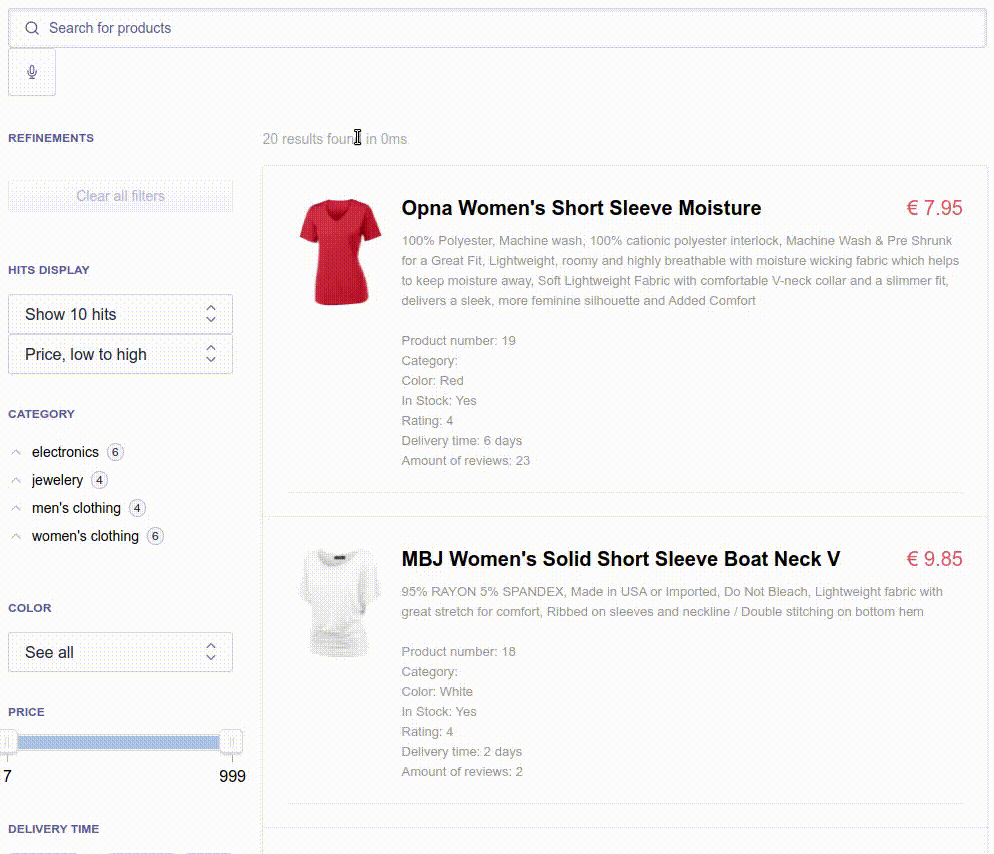itemsjs
v2.1.25
Published
Created to perform fast search on small json dataset (up to 1000 elements).
Downloads
13,130
Maintainers
Readme
ItemsJS - search engine in javascript
Extremely fast faceted search engine in JavaScript - lightweight, flexible, and simple to use. Created to perform fast search on json dataset (up to 100K items).
Demo

Use cases
Itemsjs is being used mostly for data classification of companies, products, publications, documents, jobs or plants
The solution has been implemented by people from Amazon, Hermes, Apple, Microsoft, James Cook University, Carnegie Mellon University and more. You can find a list of real implementations - here
Features
- Ultra-fast faceted search: Process and filter data with blazing speed.
- Simple full-text search: Intuitive and straightforward text searching.
- Relevance scoring: Rank search results based on relevance.
- Facet filtering and sorting: Filter and order results by various facets.
- Pagination
- Works on both backend and frontend
- Integration with custom full-text search engines
Getting Started
NPM
npm install itemsjsUsing CommonJS syntax
const itemsjs = require('itemsjs')(data, configuration);
const items = itemsjs.search();Using ES Module syntax
import itemsjs from 'itemsjs';
const searchEngine = itemsjs(data, configuration);
const items = searchEngine.search();Client side
To use as an UMD in the browser:
<!-- CDN -->
<!-- unpkg: use the latest release -->
<script src="https://unpkg.com/itemsjs@latest/dist/index.umd.js"></script>
<!-- unpkg: use a specific version -->
<script src="https://unpkg.com/itemsjs@2.1.24/dist/index.umd.js"></script>
<!-- jsdelivr: use a specific version -->
<script src="https://cdn.jsdelivr.net/npm/itemsjs@2.1.24/dist/index.umd.js"></script><script>
itemsjs = itemsjs(data, configuration);
itemsjs.search()
</script>To use as an ES module in the browser:
<!-- Include as ES Module -->
<script type="module">
import itemsjs from 'https://unpkg.com/itemsjs@2.1.24/dist/index.module.js';
// Initialize and use itemsjs here
const searchEngine = itemsjs(data, configuration);
searchEngine.search();
</script>Example usage
npm install itemsjs
# download json data
wget https://raw.githubusercontent.com/itemsapi/itemsapi-example-data/master/items/imdb.json -O data.jsonNext, create a search.js file with the following content:
const data = require('./data.json');
const itemsjs = require('itemsjs')(data, {
sortings: {
name_asc: {
field: 'name',
order: 'asc'
}
},
aggregations: {
tags: {
title: 'Tags',
size: 10,
conjunction: false
},
actors: {
title: 'Actors',
size: 10
},
genres: {
title: 'Genres',
size: 10
}
},
searchableFields: ['name', 'tags']
});
/**
* get filtered list of movies
*/
const movies = itemsjs.search({
per_page: 1,
sort: 'name_asc',
// full text search
// query: 'forrest gump',
filters: {
tags: ['1980s']
}
})
console.log(JSON.stringify(movies, null, 2));
/**
* get list of top tags
*/
const top_tags = itemsjs.aggregation({
name: 'tags',
per_page: 10
})
console.log(JSON.stringify(top_tags, null, 2));Run your script with Node.js:
node search.jsIntegrations
If native full text search is not enough then you can integrate with external full text search.
How it works:
- each item of your data needs to have
idfield. It can be also custom field but it needs to be defined. native_search_enabledoption in configuration should be disabled- index data once in your search and itemsjs
- make search in your custom search and provide
idsdata into itemsjs - done!
Examples:
API
const itemsjs = ItemsJS(data, [configuration])
data
The first data argument is an array of objects.
configuration
Responsible for defining global configuration. Look for full example here - configuration
aggregationsfilters configuration i.e. fortags,actors,colors, etc. Responsible for generating facets.Each filter can have it's own configuration. You can access those as
bucketson thesearch()response.titleHuman readable filter namesizeNumber of values provided for this filter (Default:10)sortValues sorted bycount(Default) orkeyfor the value name. This can be also an array of keys which define the sorting priorityorderasc|desc. This can be also an array of orders (ifsortis also array)show_facet_statstrue|false(Default) to retrieve the min, max, avg, sum rating values from the whole filtered datasetconjunctiontrue(Default) stands for an AND query (results have to fit all selected facet-values),falsefor an OR query (results have to fit one of the selected facet-values)chosen_filters_on_toptrue(Default) Filters that have been selected will appear above those not selected,falsefor filters displaying in the order set out bysortandorderregardless of selected status or nothide_zero_doc_counttrue|false(Default) Hide filters that have 0 results returned
sortingsyou can configure different sortings liketags_asc,tags_descwith options and later use it with one key.searchableFieldsan array of searchable fields.native_search_enabledif native full text search is enabled (true | false. It's enabled by default)isExactSearchset totrueif you want to always show exact search matches. See lunr stemmer and lunr stopWordFilter.removeStopWordFilterset totrueif you want to remove the stopWordFilter. See https://github.com/itemsapi/itemsjs/issues/46.
itemsjs.search(options)
options
per_pageamount of items per page.pagepage number - used for pagination.queryused for full text search.sortused for sorting. one ofsortingskeyfiltersfiltering items based on specific aggregations i.e. {tags: ['drama' , 'historical']}filterfunction responsible for items filtering. The way of working is similar to js native filter function. See examplefilters_queryboolean filtering i.e. (tags:novel OR tags:80s) AND category:Westernis_all_filtered_itemsset totrueif you want to return the whole filtered dataset.
itemsjs.aggregation(options)
It returns full list of filters for specific aggregation
options
nameaggregation nameper_pagefilters per pagepagepage numberqueryused for quering filters. It's not full text searchconjunctiontrue(Default) stands for an AND query,falsefor an OR query
itemsjs.similar(id, options)
It returns similar items to item for given id
options
fieldfield name for computing similarity (i.e. tags, actors, colors)minimumwhat is the minimum intersection between field of based item and similar item to show them in the resultper_pagefilters per pagepagepage number
itemsjs.reindex(data)
It's used in case you need to reindex the whole data
data
An array of objects.




